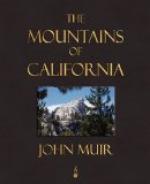On the morning of the flood, January 19th, all the Feather and Yuba landscapes were covered with running water, muddy torrents filled every gulch and ravine, and the sky was thick with rain. The pines had long been sleeping in sunshine; they were now awake, roaring and waving with the beating storm, and the winds sweeping along the curves of hill and dale, streaming through the woods, surging and gurgling on the tops of rocky ridges, made the wildest of wild storm melody.
It was easy to see that only a small part of the rain reached the ground in the form of drops. Most of it was thrashed into dusty spray like that into which small waterfalls are divided when they dash on shelving rocks. Never have I seen water coming from the sky in denser or more passionate streams. The wind chased the spray forward in choking drifts, and compelled me again and again to seek shelter in the dell copses and back of large trees to rest and catch my breath. Wherever I went, on ridges or in hollows, enthusiastic water still flashed and gurgled about my ankles, recalling a wild winter flood in Yosemite when a hundred waterfalls came booming and chanting together and filled the grand valley with a sea-like roar.
After drifting an hour or two in the lower woods, I set out for the summit of a hill 900 feet high, with a view to getting as near the heart of the storm as possible. In order to reach it I had to cross Dry Creek, a tributary of the Yuba that goes crawling along the base of the hill on the northwest. It was now a booming river as large as the Tuolumne at ordinary stages, its current brown with mining-mud washed down from many a “claim,” and mottled with sluice-boxes, fence-rails, and logs that had long lain above its reach. A slim foot-bridge stretched across it, now scarcely above the swollen current. Here I was glad to linger, gazing and listening, while the storm was in its richest mood—the gray rain-flood above, the brown river-flood beneath. The language of the river was scarcely less enchanting than that of the wind and rain; the sublime overboom of the main bouncing, exulting current, the swash and gurgle of the eddies, the keen dash and clash of heavy waves breaking against rocks, and the smooth, downy hush of shallow currents feeling their way through the willow thickets of the margin. And amid all this varied throng of sounds I heard the smothered bumping and rumbling of boulders on the bottom as they were shoving and rolling forward against one another in a wild rush, after having lain still for probably 100 years or more.




